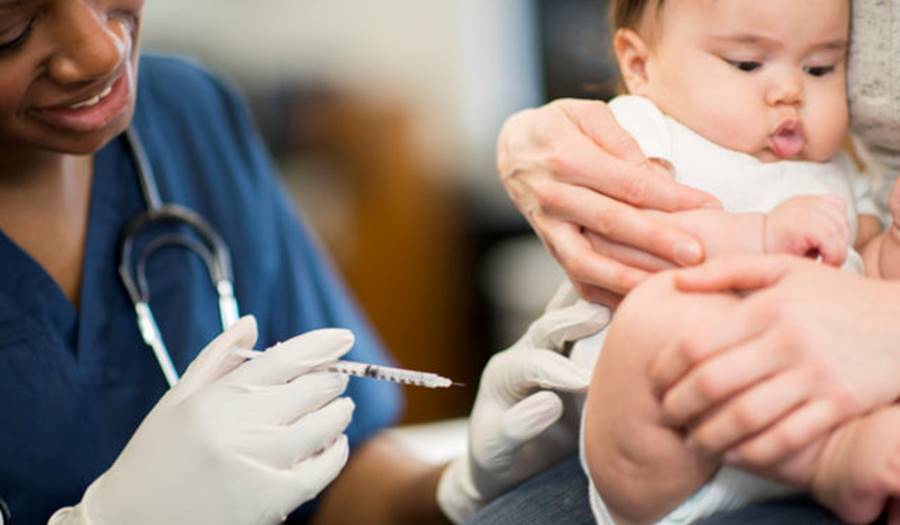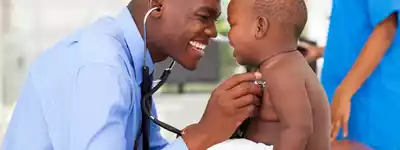
Vaccines
8/31/2020
Safe and Effective Disease Prevention
It is time to get ready for school to resume this fall, be it college or preschool. You are busy buying new school supplies, backpacks, and maybe bedding for a college dorm. Now is also the time to make sure you have an updated physical and a current health form for your child’s school Part of your child’s yearly physical exam will be determining if they need any vaccines.
A vaccine is defined as “a substance used to stimulate the production of antibodies and provide immunity against one or several diseases”. Vaccines use a weakened version of the disease, a part of the disease, a product of the disease such as a toxin, or the synthetic substituted for the disease to act as an antigen (a term used for a foreign substance). The vaccine exposes your immune system to enough of the antigen that your immune system mounts a response. When your body comes into contact with the actual disease, your immune system will already know how to fight that disease and you either do not get sick or get a very mild version of the illness. Vaccinations are a success story of modern medicine. We have been able to eradicate deadly diseases such as smallpox and are close to eradicating other diseases such as polio, diphtheria, and measles.

Vaccines can cause active or passive immunization. Active immunization is when the vaccine causes your body to create antibodies to fight the bacteria or virus. This is how most childhood vaccines work.
Passive immunization is when immunoglobulins that make up the vaccine help fight off the disease. This is how rabies vaccines work.

What ingredients make up a vaccine?
Vaccines contain antigen for a certain disease or diseases. An antigen can be a weakened live virus. This is the type of antigen used in the measles, mumps, and rubella vaccines as well as rotavirus and varicella vaccines. An antigen can also be inactivated or a skill virus. This form can’t even cause mild illness because it is not alive. This antigen is used for inactivated polio, Hepatitis A, and influenza vaccine. A partial virus is an antigen that only contains some of the virus. This antigen is used with Hepatitis B and Human Papilloma Virus vaccines. Vaccines that use partial bacteria for the antigen include Hemophilus Influenza type B, Pneumococcal, meningitis, and Diphtheria, Tetanus, and Pertussis vaccine.
Vaccines also contain other ingredients. They contain preservatives to help them from growing bad germs while being stored. They also contain additives that allow them to stay effective while being stored. In addition, vaccines continue adjuvants. Adjuvents are parts of the vaccine that help create an immune response. These additional chemicals are in very small amounts and have all been proven to be safe.
Since 2001 there is NO mercury in vaccines. One ingredient that parents are concerned about is thimerosal, a mercury-based preservative. It is used in multi-dose vials to prevent contamination. Thimerosal is used in production then removed, so it is only found in trace amounts. At CHC, we do not use have vaccines that contain thimerosal other than influenza vaccine for children over the age of 3. We do have single dose vaccines available upon request.
What is the current vaccine schedule?
This is the schedule for Children, birth through 6 years:
This is the schedule for Children 7-18 years
This is the schedule for our Patients over the age of 18 years
Are vaccines safe?
Yes! Vaccines are safe!
Vaccines are safe for most children. Children who should consult with a specialist before receiving vaccines include children with chronic conditions and children with weakened immune systems, such as a child diagnosed with cancer who is undergoing treatment. Vaccines are safe to give if your child has a minor illness including low grade fever, ear infections, cough, or diarrhea.
What side effects can my child have after vaccines?
After your child receives vaccines, they may have very mild side effects. They may have minor pain at the site of the vaccine. A baby may be fussy, may sleep more or less that day. Some children will have a low-grade fever, redness and swelling at the vaccine site, or a mild headache. Mild reactions should be reassuring…the goal of vaccination is to have your body react! If your child has severe irritability or a very high fever, please call our office to discuss.
If your child gets more than one vaccine, the risk of side effects does not increase. If your child does have side effects after vaccination, you can try a cool compress and rest. You may also give a pain reliever if needed though this should be done with caution as there are a few new research studies done that show acetaminophen may reduce your child’s response to the vaccine.
Severe reactions are very rare and happen in less than 1 time for every 1 million vaccines given. Vaccine reactions are recorded with VAERS. VAERS stands for the Vaccine Adverse Event Reporting System. This helps scientist track any reactions that children have to vaccines.
If I give all the recommended vaccines, isn’t that too much for my baby?
Some parents worry that giving vaccines on the recommended schedule may be too much for their baby’s body. This is not true. Your baby comes across 2000-6000 antigens EVERY day. The immune system has to respond to all of those foreign substances. If we were to give ALL the childhood vaccines all on the same day it would only expose your child to 150 antigens.
We know that administering the vaccines as directed by the Child & Adolescent Immunization schedule is safe and effective. This schedule is based on scientific data and is updated yearly. The timing of shots is very specific. It combines the timing needed for your child’s immune system to provide optimal protection against the diseases and when your child needs that protection.
We do not recommend spacing out or delaying vaccines. Delaying vaccines puts your child at risk for preventable diseases. We also know the expected immune response is effective with the schedule, it may not be as effective when vaccines are given individually or on a delay.

Don’t vaccines cause Autism Spectrum Disorder?
There is NO link between Autism Spectrum Disorder (ASD) and vaccines. Because of a poorly conducted study done in 1998 with a group of only 12 children, Measles, mumps, and rubella vaccine (MMR) was incorrectly suspected in causing ASD. Since that time, that study has been retracted which means it was removed from scientific record because the study was fraudulent, was poorly conducted, and misinterpreted data. The ramifications of the study have included vaccine refusal. This resulted in a steady increase in vaccine preventable disease and is becoming a public health crisis.
Many studies have proven that study wrong and have shown that MMR vaccine does NOT cause autism. In fact, rates of autism are the same in same size groups of children whether or not they had the vaccine. For more information about Autism and MMR, please refer to www.autismsciencefoundation.org as well as Children’s Hospital of Philadelphia’s Vaccine Education Center run by Dr. Paul Offit (www.chop.edu).
How to help your child with Vaccines
Babies
A pacifier may help your baby tolerate vaccines better. You can also sooth, stroke, or rock your baby right after. Also holding your baby on your lap during vaccines can be comforting
Young Children
Young children can also be soothed by touches, hugs, and rocking. You can also sing songs, tell them a story and give them a tight hug during the vaccines.
Older Children
Older children can try blowing out, blowing a pinwheel or blowing bubbles, or deep breathing. You can also give them a tight hug, tell a story, and sing songs. Some kids like the “cough trick” where they cough when getting the shot. Older children also benefit from having some control. They may be able to choose where they get the shot, which shot goes first, or which bandage they like best.
Tips for Vaccination Visits
- Do not promise your child “no shots” before a visit
- Do not treat shots like they are a punishment
- Discuss techniques you can use to help calm them while they receive the vaccine
- Explain why we give vaccines.
- Validate their feelings
Explaining Vaccines
Vaccines are like a Superhero! They fight the bad guys. In this case the bad guys are tiny little germs. We need to make you into a germ fighting Superhero. In order to do that, we have to give you a bit of a “medicine’ that teachers your body how to do this. The medicine won’t work if you drink it, to get in your body, we have to give it into your arm by a shot.
We can also use COVID-19 as a teaching moment. We can discuss that we wear masks because we don’t know how to fight those germs but there are other germs we do know how to fight. We have vaccines to teach your body how to fight those germs. We can also reassure kids that scientists are working very hard right now to learn how to fight COVID-19.
Our goal at CHC is to help you raise healthy, happy children. Part of our goal is to reduce the risk of your child contracting disease. We are so lucky to be raising children at a time where we can do this! We have safe and effective vaccines that reduce your child’s risk of disease and the consequences and complications of these diseases. Please check out next week’s blog to see what diseases we are preventing your child from contracting as well as look back at the history of vaccines! Did you know “vaccination” was present as early as 1000 CE (common era)!!
Children’s Health Care of Newburyport, Massachusetts and Haverhill, Massachusetts is a pediatric healthcare practice providing care for families across the North Shore, Merrimack Valley, southern New Hampshire, and the Seacoast regions. The Children’s Health Care team includes pediatricians and pediatric nurse practitioners who provide comprehensive pediatric health care for children, including newborns, toddlers, school aged children, adolescents, and young adults. Our child-centered and family-focused approach covers preventative and urgent care, immunizations, and specialist referrals. Our services include an on-site pediatric nutritionist, special needs care coordinator, and social workers. We also have walk-in appointments available at all of our locations for acute sick visits. Please visit chcmass.com where you will find information about our pediatric doctors, nurse practitioners, as well as our hours and services.
Disclaimer: this health information is for educational purposes only. You, the reader, assume full responsibility for how you choose to use it.








